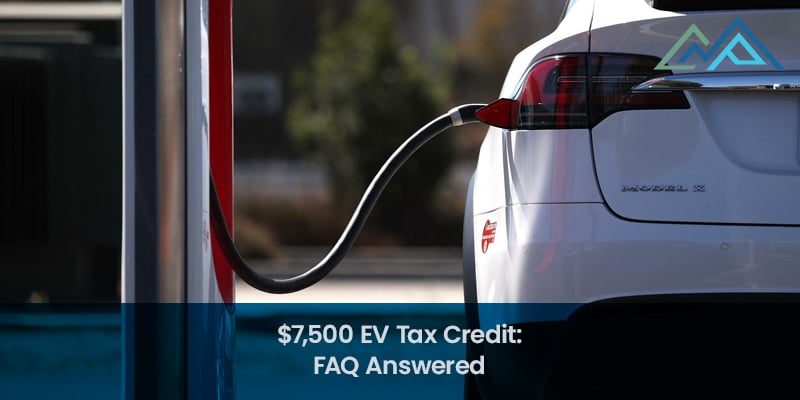Tax credits are one of the best ways to reduce your tax burden. Many people miss out on federal tax credits because they don’t know about them or aren’t sure they qualify. One of the most significant new tax credits is the EV Tax Credit for people who purchase a qualified electric vehicle. Initially passed in 2008, the EV Tax Credit has recently been updated, and these changes can have a significant impact on your taxes.
At CMP, we always aim to ensure our clients don’t pay more than required. With that in mind, here are some of the most frequently asked questions about the EV tax credit.

What is the EV Tax Credit?
The EV tax credit is meant to incentivize American drivers to move away from driving gas-powered vehicles and buy electric vehicles instead. Electric vehicles have lower carbon emissions than traditional cars, and driving them helps to reduce reliance on fossil fuels.
The old tax credit, which expired on August 15, 2022, allowed taxpayers to deduct up to $7,500 from their taxes owed. The downsides of the old credit were that it was not refundable, which meant that some taxpayers received no benefit, and there were limits on how many consumers could claim the credit.
Due to the new Inflation Reduction Act, the updated EV tax credit will provide between $2,500 and $7,500 in tax relief. The credit calculation is based on a complex formula that includes information about where the components of the car are manufactured and where the vehicle is assembled.
As of right now, the new EV tax credit will be applied when you file your federal tax return. However, the plan is to change that rule effective at the beginning of 2024, at which point taxpayers will have the option to claim the EV tax credit for a dollar-for-dollar reduction in the price of the car being purchased.
How Does the Electric Vehicle Tax Credit Work?
The EV tax credit used to be a dollar-for-dollar reduction in taxes owed. That structure benefited people who owed taxes at the end of the tax year but did nothing for people who earned a refund because the credit was non-refundable.
If you bought an electric vehicle before August 16, 2022, you could still claim the old EV tax credit when you file your tax return. You’ll need to follow the same procedure for vehicles purchased between August 16, 2022, and December 31, 2023, until the procedure is updated in January 2024.
What Are the Eligibility Requirements for the EV Tax Credit?
There are three key requirements for people who want to take advantage of the EV tax credit. The first applies to the buyer’s income, the second to the value of the vehicle being purchased, and the third to the eligibility of the vehicle itself.
What is the EV Tax Credit Income Limit?
The Inflation Reduction Act places income limitations on who qualifies for the EV tax credit:
- Single taxpayers or married people filing separately must have a modified adjusted gross income of $150,000 or less.
- Married people filing jointly must have a modified adjusted gross income of $300,000 or less.
- Single heads of household must have a modified adjusted gross income of $225,000 or less.
The maximum income requirements for used vehicles are slightly lower:
- $75,000 for an individual
- $150,000 for married filing jointly
- $112,500 for single heads of household
If you meet these income requirements and purchase an electric vehicle that qualifies, then you can claim the EV tax credit when you buy a vehicle.
Which Vehicles Qualify for EV Tax Credits?
Here are the things you need to know about vehicle qualifications:
- Vehicle Cost. An electric car must have a retail cost of $55,000 or less. The limit is $80,000 for electric trucks, vans, and SUVs.
- Vehicle Assembly. Only vehicles assembled in North America are eligible for the new EV tax credit.
- Vehicle Components. There is an exclusion for vehicles that include components from “foreign entities of concern,” including China and Russia. That exclusion goes into effect on December 31, 2023.
- Must have a battery capacity of at least 7 kilowatt hours.
- Have a gross vehicle weight rating of less than 14,000 lbs.
- Must be made by a qualified manufacturer. See list here. (except FCV's)
- Vehicle Type. New electric and fuel cell vehicles qualify, as well as some new plug-in hybrid vehicles. The new law also provides credit for some used vehicles.
- Vehicle Purchase. The credit for used cars is available only when a used EV is purchased through a dealer.
Most of this information you should be able to find on the sale sticker on the window.
This is a fluid list, and has changed. Be sure to check with your accountant on what qualifies.
Does the EV Tax Credit Apply to Leased and Used Vehicles?
One of the biggest differences between the old EV tax credit and the new one is that the new one applies, with certain restrictions, to used vehicles. It does not apply to leased vehicles.
The requirements for used vehicles include lower income caps for eligible taxpayers. To claim the EV tax credit for a used electric vehicle, you will need to earn $75,000 or less as a single taxpayer. The limit is $112,500 for single heads of household and $150,000 for married couples filing jointly.
Another requirement is that any used electric vehicle must be purchased from a dealership. In other words, private car sales between individuals are excluded from claiming the EV tax credit.
Here are a few other requirements for used electric vehicles.
- The vehicle must be at least two calendar years old.
- The credit is not available to dealers who purchase EVs for resale.
- The purchase price must be $25,000 or less.
- The credit may only be claimed once per vehicle.
Is There a Tax Credit for Fuel Cell Vehicles?
The new EV tax credit does apply to fuel cell vehicles, provided that they meet the same requirements that apply to other electric vehicles. That means they must have their final assembly in the United States and meet the other requirements laid out in the new law.
How Do You Claim the Electric Vehicle Tax Credit?
Most tax credits require taxpayers to complete a tax form and attach it to their Form 1040. The old EV tax credit required the completion of Form 8936 During the initial rollout of the new EV tax credit. Taxpayers will need to use the same method of filling out Form 8936.
However, by the beginning of January 2024, consumers will have the option to claim EV tax credits at the point of sale. That means that consumers will receive an immediate price reduction based on their vehicle’s eligibility. For example, a $50,000 vehicle that qualified for the full $7,500 EV tax credit would be reduced in price from $50,000 to $42,500.
Another way to look at it is that the new credit would allow you to save in two ways. If you’re paying cash for a vehicle, you will pay less because of the credit. If you’re financing the purchase of your vehicle, you will save on interest because you’d only need to borrow the reduced amount.
Can You Claim Both Federal and State EV Tax Credit and Incentives?
The federal EV tax credit applies to all qualifying US taxpayers. One of the questions we’ve been frequently asked is whether it’s allowed to claim both the federal credit and a state credit or incentive.
The short answer is YES. Of course, you will need to meet state requirements to claim the credit. For example, as of 2022, Utah offers an EV tax credit only for heavy-duty vehicles and trucks. That may change in the future. We suggest reviewing your state’s laws or working with an experienced CPA to determine your eligibility.
You can find a list of EV tax credits and incentives by state at the links below.
When Will the EV Tax Credit Be Available?
The Inflation Reduction Act was signed into law by President Joe Biden on August 16, 2022. However, the new credit does not officially take effect until December 31, 2022. The gap creates a question about credit eligibility for people who have purchased new clean vehicles in 2022.
The exception has been addressed by allowing taxpayers who qualified for the old credit to claim that credit when they file their 2022 tax returns. If you have purchased a qualifying EV and have not yet claimed your credit under the old law, there is still time to do so.
Some consumers are holding off on purchasing a new EV until vehicle qualifications are more thoroughly outlined and EV tax credits improve even more.
How Can I Maximize My EV Tax Credit?
The amount of the EV tax credit is determined by a two-part formula that incorporates information about where the battery materials are processed or extracted as well as where the components are made. Here’s how it breaks down.
- The first half of the tax credit, up to $3,750, is determined by the percentage of battery materials that are either extracted or processed in the United States or in a country that has a free trade agreement with the US. For 2023, the requirement for the full credit is that 40% of battery materials meet this requirement. The amount is slated to increase to 80% as of 2027.
- The second half of the tax credit, also a maximum of $3,750, is based on where the majority of a vehicle’s battery components are assembled. The required percentage of assembly to take place in North America will start at 50% in 2023 and increase to 100% by 2029. The battery's final assembly must occur in the United States, Canada, or Mexico.
Because the EV rules from the Inflation Reduction Act are still new, there is ongoing work to help consumers determine eligibility for vehicles. We anticipate that there will be updates to the IRS list of eligible vehicles, and we will update this post as new information becomes available.
Our CPA Can Help You Take Advantage of the EV Tax Incentive
The new EV tax credit included in the Inflation Reduction Act can help you save money when you purchase a new or used qualifying electric vehicle. If you’re in the market for a new car, you can use the credit to lower your up-front and financing costs, or if you’ve purchased recently, you can claim the credit for the 2022 tax year. Our qualified tax professionals can help you understand the EV tax incentive and maximize your benefits.

















